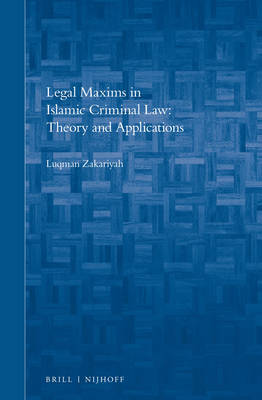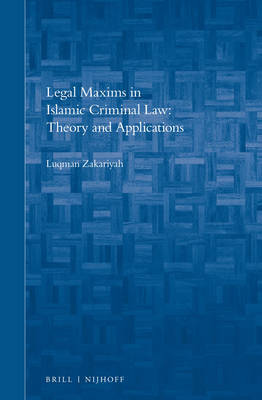
- Afhalen na 1 uur in een winkel met voorraad
- Gratis thuislevering in België vanaf € 30
- Ruim aanbod met 7 miljoen producten
- Afhalen na 1 uur in een winkel met voorraad
- Gratis thuislevering in België vanaf € 30
- Ruim aanbod met 7 miljoen producten
Zoeken
Legal Maxims in Islamic Criminal Law: Theory and Applications
Theory and Applications
Luqman Zakariyah
€ 289,95
+ 579 punten
Omschrijving
Using contemporary illustrations, Legal Maxims in Islamic Criminal Law delves into the theoretical and practical studies of al-Qawaid al-Fiqhiyyah in Islamic legal theory. It elucidates the importance of this concept in the application of Islamic law and demonstrates how the concept relates to the objectives of Islamic law (maqāṣid al-Sharī'ah), generally. Included in this examination are the following maxims: al-Umūr bi-Maqāṣidihā ("Matters shall be Judged by their Objectives"); al-Yaqīn lā Yazūl bi-sh-Shakk ("Certainty Cannot be Overruled by Doubt"); al-Mashaqqa Tajlib at-Taysīr ("Hardship begets Facility"); Lā Ḍarar wa-lā Ḍirār ("No Injury or Harm shall be Inflicted or Reciprocated"); and al-ʿĀda Muḥakkama ("Custom is Authoritative").
Specificaties
Betrokkenen
- Auteur(s):
- Uitgeverij:
Inhoud
- Aantal bladzijden:
- 248
- Taal:
- Engels
- Reeks:
- Reeksnummer:
- nr. 9
Eigenschappen
- Productcode (EAN):
- 9789004258365
- Verschijningsdatum:
- 22/10/2015
- Uitvoering:
- Hardcover
- Formaat:
- Genaaid
- Afmetingen:
- 157 mm x 241 mm
- Gewicht:
- 498 g

Alleen bij Standaard Boekhandel
+ 579 punten op je klantenkaart van Standaard Boekhandel
Beoordelingen
We publiceren alleen reviews die voldoen aan de voorwaarden voor reviews. Bekijk onze voorwaarden voor reviews.








